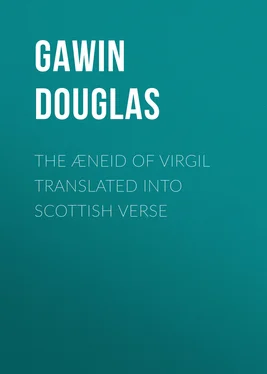Gawin Douglas - The Æneid of Virgil Translated Into Scottish Verse
Здесь есть возможность читать онлайн «Gawin Douglas - The Æneid of Virgil Translated Into Scottish Verse» — ознакомительный отрывок электронной книги совершенно бесплатно, а после прочтения отрывка купить полную версию. В некоторых случаях можно слушать аудио, скачать через торрент в формате fb2 и присутствует краткое содержание. Жанр: foreign_poetry, Поэзия, foreign_antique, foreign_prose, на английском языке. Описание произведения, (предисловие) а так же отзывы посетителей доступны на портале библиотеки ЛибКат.
- Название:The Æneid of Virgil Translated Into Scottish Verse
- Автор:
- Жанр:
- Год:неизвестен
- ISBN:нет данных
- Рейтинг книги:4 / 5. Голосов: 1
-
Избранное:Добавить в избранное
- Отзывы:
-
Ваша оценка:
- 80
- 1
- 2
- 3
- 4
- 5
The Æneid of Virgil Translated Into Scottish Verse: краткое содержание, описание и аннотация
Предлагаем к чтению аннотацию, описание, краткое содержание или предисловие (зависит от того, что написал сам автор книги «The Æneid of Virgil Translated Into Scottish Verse»). Если вы не нашли необходимую информацию о книге — напишите в комментариях, мы постараемся отыскать её.
The Æneid of Virgil Translated Into Scottish Verse — читать онлайн ознакомительный отрывок
Ниже представлен текст книги, разбитый по страницам. Система сохранения места последней прочитанной страницы, позволяет с удобством читать онлайн бесплатно книгу «The Æneid of Virgil Translated Into Scottish Verse», без необходимости каждый раз заново искать на чём Вы остановились. Поставьте закладку, и сможете в любой момент перейти на страницу, на которой закончили чтение.
Интервал:
Закладка:
CAP. VI
Quhou Eneas hym grathys to depart,
To quhom Dido heir carpys with sayr hart.
Bot than Ene half mad and dum stude als,
Vpstart his hair, the voce stak in his hals.
Sayr he langis to fle and to depart;
And that sweit cuntre, on the tother part,
To leif ful laith wes hym, or go at large.
Astonyst he wes to syt sa hie a charge,
Or dysobey the gret godis beheste.
Allace! quhat suld he do? oneth he wist;
Or with quhat wordis suld he now assay
The amorus queyn forto requir and pray,
Or on quhat wys hys taill he mycht begyn;
Baith to and fra compasyng, hys breist within,
Feill purpossys for euery part about.
And, at the last, thus as he stude in dout,
Thys resson hym semyt fynaly the best:
He callys to hym Mynestheus and Sergest,
And strang Cloanthus; and bad thai suld, in hy,
Do graith hys schyppys and navyn secretly,
And gaddir hys folkis towart the cost togydder;
Armour and al thyng necessar bring thyddir,
And to dissymyll, gif ony axit quhy
Thai thus addressyt thar geyr sa suddanly:
Hym self, he said, the meyn quhile, suld assay
To purches leif to pas and go away,
And wait hys tyme to speke tharof maist habill,
Quhen that the queyn Dido, maist honorabil,
Suld not beleif sa sone he kouth depart,
Nor sa gret luf dissyvir mycht be na art.
At hys command thai al glaidly furth went,
And bissely begouth speid hys entent.
Bot sone the queyn persavyt al the slycht:
Quhay may begile a luffar, day or nycht?
Thar departing at hand fyrst scho aspyis,
Dredyng all sovir thing, as is the gys
Of euery luffar al tyme to stand in feir.
This ilke cursyt Fame, we spak of eyr,
Bair to the amorus queyn noys, and gan rown,
The schippis ar grathand, to pas thai mak thaim boun.
Quharfor, inpacient, and myndles in hir rage,
Scho wyskis wild throu the town of Cartage;
Syk wys, as quhen thir nunnys of Bachus
Ruschis and relis our bankis, brays, and bus,
Quhen, euery thryd ȝeir, on thar payane gys,
Thar goddis feist thai hallow with lowd cryis,
That, al the nycht, the mont of Cytheron
Resoundis of thar clamour, quhar thai gone.
And at the last, ȝit thus, of hir fre will,
Eftir lang musyng, scho spak Eneas tyll:
With dissymulance wenyt thou, onfaithfull wight,
Thou mycht haue hyd fra me sa fals a slycht,
And, myne onwyttyng, steill furth of my land?
That nothir our gret lufe, promys, nor rycht hand
Gevyn me vmquhile, may the heir withhald,
Nor cruel deth of Didois cors so cald!
Gif thou depart, and forthir quhat wald thou do,
In wyntir sesson pres graith thi navy, lo!
And the addres to pas throu the wod see,
Myd tyme quhen stormys and wyndis blaw maist hie;
Art thou sa cruel? I put the cace, alsso,
That to nane onkouth landis the list go,
Nother to fremmyt place, nor stedis will,
Bot that auld Troy war ȝyt vpstandand still;
Aucht thou, ȝit than, leif this weilfair and joy,
And in sik perrell seik throu the sey to Troy?
Quhat! wilt thou fle from me? allace! allace!
Be all thir teris trygland our my face,
And be that rycht hand vmquhile thou me gave;
Sen to my self nocht ellis left I have,
Now wrachit catyve; be our treuth plychting eyk,
And be our spowsage begunnyn, I the beseik,
Gif euer ony thank I deservit towart the,
Or ocht of myne to the wes leif, quod sche,
Haue mercy of our lynnage reddy to spill;
Gif tyme remanys ȝit thou heir prayeris will,
This fremmyt mynd, I pray ȝou, do away.
For the I haue beyn hatyt, this mony a day,
With all the pepill of Affrik, and with the kyng
That rewlys the land of Numyda and ryng;
For the myne awyn Tyrianys ar with me wraith;
For the is womanheid went and wirschip baith,
And my first fame, lavd, and renownye,
Quharby I wes rasyt to the starnys hie.
Reddy to de, and my selvyn to spill,
My sweit gest, quhamto thou me leif will?
My gest, ha God! quhou al thyng now invane is,
Quhen of my spows nane othir name remanys!
Bot quharto suld I my ded langar delay?
Sal I abyde quhil thou be went away,
And quhil myne awyn brothir, Pigmaleon,
Bet down the wallis of my cite onon,
Or stern Hyarbas, kyng of Getule,
Led me away into captiuite?
Bot, at the leist, tofor thi wayfleyng,
Had I a child consavyt of thyne ofspryng,
Gif I had ony ȝong Eneas small,
Befor me forto play within my hall,
Quhilk representit by symylitude thi face;
Than semyt I nocht, thus wys, allace! allace!
Aluterly dissauyt nor dissolate.
Thus said the queyn Dido, in febil estate.
Bot, apon Jovis message fermly he
Stude musyng so, he movit nocht ane E;
Refrenyt his will, hydand in hart his thocht,
And, at the last, thir few wordis hes furth brocht:
O gentil queyn, that sall I nevir deny,
Thy gude deid and desart is mair worthy
Than thou with wordis or tong may expreme;
Nor it sal nevir me irk, na ȝit mysseym,
The worthy Dido to hald in fresch memory,
So lang as that my self remembir may I,
Or quhil the spreit of lyfe this body steris.
As the mater requiris, a litil heris:
I purposyt nocht forto hyde thyftuusly
My vayage, nor, as ȝe weyn, secretly
Away to steil; quhat nedis ȝou sa to feyn?
For I pretendit nevir, be na meyn,
With ȝou to mak the band of mariage,
Nor in that ȝok, ne frendschip in Cartage,
Ȝyt come I nevir: bot gif the fatis, but pled,
At my plesour sufferit me lyfe to led,
At my fre wil my warkis to modyfy,
The cite of Troy than first agane suld I
Restore, and of our deir frendis remanys
Gaddir togiddir, and to the venquist Troianys
Raparal with my handis agane thar wallis,
And beild vp Priamus palyce at now fallis.
Bot sen Appollo, clepit Gryneus,
Gret Italy to seik commandis ws,
To Itale eik oraclys of Lycia
Admonyst ws, but mair delay, to ga;
Thar is my lust now, and delyte at hand,
Thar is my cuntre, and my natyve land.
Gif the, of Cartage the burgh and towris swa,
Quhilk art a woman of Phenycia,
And the aspect of citeis Affricane
Delytis, and withhaldis heir to remane,
Quhat wrang is it, caus of envy or schame,
Thocht Troianys seik to Itale for thar hame?
Or is it nocht als lesum and ganand
That fynaly we seik to onkouth land?
Als oft as day is gone, and the dyrk nycht
With hir donk schaddow hydis of the erth the sycht,
Als oft as schynyng starnys doith vprys,
My faderis gost, Anchises, als feil sys
Into my sleip mannasis me tharto fast,
And oft his feirfull ymage doith me agast;
And, in lyke wys, the child Ascanyus,
Quhais deir hed suffir iniurys is hard to ws,
Quham of the realm of Itail I defraud,
And fra the grond to hym promyst withhawd.
Be athir of our hedis this I sweir;
Now laitly eik of goddis the messynger,
From hie Jupiter in hasty message sent,
Down throu the ayr brocht the ilk commandment:
On fair day lycht, myne awyn self dyd I se
Mercur, the God, entyr in this cite,
And his wordis with thir sam eris hard I.
With thy complayntis ony langar, forthy,
Lat be to vex me, or thy self to spyll,
Sen I seik nocht to Itale with fre will.
CAP. VII
Of the scharp wordys queyn Dydo dyd say,
And how Eneas bownys fast away.
Dydo, aggrevit ay quhil he his tayl tald,
With acquart luke gan to wart hym behald,
Rollyng vmquhile hir eyn, now heir, now thar,
With syght onstabil waverand our alquhar;
And all enragyt thir wordis gan furth braid:
Nothir wes a goddes thy moder, as is sayd,
Nor ȝyt kyng Dardanus cheif stok of thi kyn,
Thou treuthles wyght; bot, of a cald hard quhyn,
The clekkyt that horribill mont, Cawcasus hait;
Thou sowkyt nevir womanis breist, weil I wait,
Bot of sum cruel tygir of Araby
The pappys the fosterit in the wod Hyrcany.
To quhat effect suld I hym langar perswaid,
Or quhat bettir may beleve than he hes said?
Quhiddir gif he murnyt quhen we wepit and walyt?
Quhiddir gif he steryt his eyn, as ocht hym alyt?
Quhidder gif, for rewth, he furthȝet anys a teyr,
Or of hys lufe had piete? na, not to ȝeir.
Quhou sal I begyn, quhat first, quhat last to say?
Now, now, nothir gretast Juno, wallaway!
Nor Saturnys son, hie Jupiter, with just eyn
Hes our querrell considerit, na ourseyn;
For no quhar now faith nor lawte is fund.
I ressavyt hym schyp brokkyn fra the sey grund,
Wilsum, and mystyrfull of al warldis thyng,
Syne, myndles, maid hym my fallow in this ryng:
Hys navy lost raparalyt I, but faill,
And hys feris fred from the deth alhaill.
Allace! enragyt or enchantit am I;
Quhen now Appollo, with hys sossery,
And quhilis, he says, the kavillys of Lycia,
And quhilis, fra Jupiter down sent alsswa,
The messynger of goddis bryngis throu the skyis
Sa feirful charge and command on this wys:
Lyke as the goddis abufe nocht ellys rocht,
Bot on thi passage war al thar cuyr and thocht.
Nothir wil I hald the, nor thi wordis contrar:
Pas on thi way, towart Itale thou fair;
Seik throu the fludis with wyndis to that ryng.
Forsuyth, gif reuthfull goddis may ony thing,
Amyd thi way, I traist, on rolkis blak
Thou sal deir by thy treuth thou to me brak,
And clepe oft my richt name, Dido, Dido!
With fyre infernale, in thine absens alsso,
I sal the follow; and, fra the cald ded
Reif from my membris this sawle, in euery sted
My gost salbe present the to agrys:
Thou salt, onworthy wyght, apon this wys,
Be punyst weil; and tharof wald I heyr;
The fame tharof sal cum onto myne eyr,
Vndir the erth, amang the schaddowys law.
And this spokkyn, hir sermond, with the ilk saw,
Brak scho in twane, ful dolorus in hir thocht:
The lycht scho fled, and, als fast as scho mocht,
Turnys frawart hym, and wyskyt of hys sycht,
On seir materis leifand hym pensyve wight,
And purposyng to haue said mony thyngis.
The damycellis fast to thar lady thryngis,
That was in dedly swoun plat for dispar:
Vp thai hyr hynt, and to hyr chawmyr bayr,
Quhilk was of marbill wrocht, and in hir bed
Laid softly down apon rych carpettis spred.
Bot ȝyt, althocht the reuthfull Eneas
The dolorus queyn to meys ful bissy was,
To do hir comfort, and hir dyseys asswage,
And with hys wordis return hir sad curage,
Bewalyng mekill hyr sorow and distres,
Proplexte in mynd by gret lufe; netheles,
The command of the goddis, by and by,
He execut, and vysseys hys navy.
Than byssely the Troianys fell to wark,
And mony gret schyp, ballyngar, and bark,
Langis the cost brocht in, and bet full weill.
Now fletis the mekil holk with tallonyt keyll:
The burgionyt treys on burd thai bring for aris,
Weltis down in woddis gret mastis, and na thing sparis,
Saysyng half onwrocht, so ithand thai war fair bown.
Rynnand heir and thar, and wendyng fast of town,
Ȝhe mycht haue seyn thame haist, lyke emmotis grete
Quhen thai depulȝe the mekill byng of quhete,
And in thar byke it careis, all and sum,
Providing for the cald wyntir tocum:
The blak swarm our the feildis walkis ȝarn,
Tursand throu the gers thar pray to hydlys darn:
Sum on thar nek the gret cornys vpwrelis,
And our the furris bissely tharwith spelys;
Sum constrenyng the otheris fast to wirk;
And sum the sleuthful chasteis, that thocht irk
Of thar labour; quhil euery rod and went
Wolx of thar ithand wark hait, quhar thai went.
Интервал:
Закладка:
Похожие книги на «The Æneid of Virgil Translated Into Scottish Verse»
Представляем Вашему вниманию похожие книги на «The Æneid of Virgil Translated Into Scottish Verse» списком для выбора. Мы отобрали схожую по названию и смыслу литературу в надежде предоставить читателям больше вариантов отыскать новые, интересные, ещё непрочитанные произведения.
Обсуждение, отзывы о книге «The Æneid of Virgil Translated Into Scottish Verse» и просто собственные мнения читателей. Оставьте ваши комментарии, напишите, что Вы думаете о произведении, его смысле или главных героях. Укажите что конкретно понравилось, а что нет, и почему Вы так считаете.












